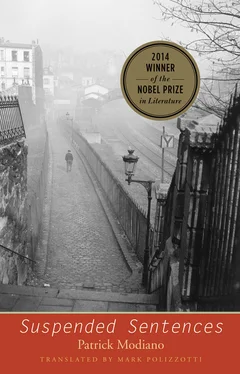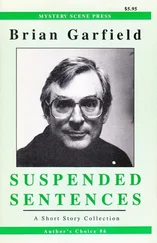Patrick Modiano
Suspended Sentences
INTRODUCTION: MISSING by Mark Polizzotti
A feeling of indirection pervades many of Patrick Modiano’s writings, and the three short novels in this volume are no exception. For all the specificity of detail — locations catalogued with loving precision, particular casts of light and shadow — one can’t escape a sense of haziness, as if everything were shrouded in gauze or viewed through a Vaselined lens. The narrative voice adds to this impression, the protagonists often placing themselves just to the side of the situation they’re describing. Like the prose in which they couch their stories, these narrators maintain a slight remove, as if full engagement with one’s surroundings carried the threat of great pain, or mortal danger.
Readers familiar with Louis Malle’s film Lacombe Lucien (1974), for which Modiano co-wrote the screenplay, will recognize this disengagement: it’s the same unconsciousness that lets the title character drift into the world of French fascism, as if by accident. In the novellas included here, a similar diffidence colors the author’s efforts in Afterimage to sort out his memories of the photographer Jansen, and the attempts by Patoche, the ten-year-old hero of Suspended Sentences , to penetrate the dubious adult world in which he and his brother live. Even the somewhat more skeptical protagonist of Flowers of Ruin is stymied by his inconclusive pursuit of the elusive Pacheco.
What becomes clear as we read these books is that the inconclusiveness of the pursuit is central to the story — indeed, is the story. Modiano’s narrators seem fatally drawn to individuals who are uncommonly vague about themselves and their situation, people whose ability to engage the writer’s emotional investment — and, one senses, to cause him harm — stands in inverse proportion to the amount of reliable information he’s able to garner about them. Each of these novellas turns around a gap, a center that cannot hold: the nebulous Pacheco, the taciturn Jansen (for whom, in turn, the departed Robert Capa and Colette Laurent open a breach), and, for little Patoche, the figure of Annie, she of the bobbed hair, leather jacket, and exotic blue jeans, at once big sister and preadolescent crush, the main actor in a play of bewildering dialogues, entrances, and exits. It’s as if each of these figures held the key to a great conundrum, as if they alone could bring everything into focus, but never do. Then again, perhaps this is intentional, for as Modiano confesses elsewhere, “The more obscure and mysterious things remained, the more interested I became in them. I even looked for mystery where there was none.”
As befits the wistful undertone of these narratives, their setting is mainly a world gone by. Time and again we’re reminded that a particular Parisian building or neighborhood was later razed to make room for something else, or are given a privileged introduction to an obscure nook of the city, usually near the outskirts, that harks back to earlier decades: the Hameau du Danube, the Poterne des Peupliers … One could easily read these novellas as a three-part love song to a Paris that no longer exists, or that most people’s eyes do not see. Despite the action’s contemporary setting and the frequent references to bright sunlight, we find ourselves plunged into the atmosphere of Marcel Carné’s fog-drenched films, Edith Piaf’s smoky laments, and Brassaï’s nocturnal photographs. And, fittingly as well, the geography is more often than not the working-class neighborhoods of the city’s northern quarters, or Saint-Germain-des-Prés before it became overrun with tourists and new money. The periphery, the zone, the no-man’s-land where people stay just outside the law to get by: this is the territory of these novellas.
Few French writers have evoked Paris with as much fondness and nostalgia as Modiano. Baudelaire comes to mind, glowering with disapproval at the newly Haussmannized boulevards as he memorializes the “swarming city, city filled with dreams” (for while “the city scape / Is quick to change, less so the human heart”). So does Aragon, the Paris peasant, conserving the gallerias of the second arrondissement and their alluring, defunct storefronts. Modiano’s fictions offer a connoisseur’s excavation of the capital, a romance of lost itineraries, such as his detailed re-creation in Flowers of Ruin of Urbain and Giselle T.’s possible routes from Paris to the suburban town of Le Perreux; or the lists — how these books do love lists! — of the sites on which the Jansen of Afterimage trained his camera; or the resurrection, in Suspended Sentences , of the ill-defined “zone where Neuilly, Levallois, and Paris all blended together,” whose “streets were wiped off the map when they built the périphérique , taking with them all their garages and their secrets.”
Although published separately over a period of five years, the novellas in this volume have remarkable coherence, even if that coherence was unintentional. Modiano’s comment for a French omnibus edition of his novels applies just as well here: taken together, he says, those books “form a single work…. I thought I’d written them discontinuously, in successive bouts of forgetfulness, but often the same faces, the same names, the same places, the same sentences recur from one to the other.”
The resulting impression is of a self-contained world in which figures move and evolve but remain fundamentally similar, as if in a less grandiose version of Balzac’s Comédie humaine , a less buffoonish commedia delll’arte , or Wes Anderson’s ensemble-cast tragicomedies. People reappear at unexpected moments, like those vaguely recognized characters one sees around the neighborhood. Coincidences occur, sometimes remarked upon, sometimes passing unnoticed. It’s as if everything in Modiano’s books, including the books themselves, were governed by the six proverbial degrees of separation.
Among the recurrences one will find in these pages, there is the older woman who shows the preadult narrator some rare kindness (Annie in Sentences , the Danish girl in Flowers) , only to be snatched away by someone more age-appropriate (often wearing a glen plaid suit). There is Pacheco, the great enigma, who intersects with the mystery of the T.’s in Flowers of Ruin , and who also makes a cameo appearance in the novel Honeymoon (1990). There is the “Rue Lauriston gang” (known to history as the Carlingue), part band of thieves, part Gestapo auxiliary, whitewashing its actions with a false patina of respectability. There is the black marketeer and collaborationist Eddy Pagnon, cryptically associated with Modiano’s father. And there is the primal scene of the father’s wartime arrest as an undocumented Jew by the French police, his liberation by that same Pagnon before he can be deported to a camp — and, in the background, the moral ambiguities of the Occupation and the indelible stain they have left on French history. This episode, which reappears, with variants, in all three books (though in Afterimage the father’s role is played by Jansen), and in several others besides, is one of two central knots in Modiano’s writing, like a trauma that can be recounted over and over but never exhausted. The other is the childhood death of his kid brother, Rudy; but of that pivotal event we hear no more than a whisper.
The temptation, when reading Modiano’s fictions, is to assume they are slices of autobiography. Understandably so: alongside the repetition of nodal scenes, there are numerous correspondences between the personal histories of his storytellers (named Patrick, or its diminutive Patoche, and born, like him, in 1945) and the known facts of the author’s own life. A number of these concordances were made explicit — unless they, too, were more invention — in his 2005 memoir
Читать дальше












